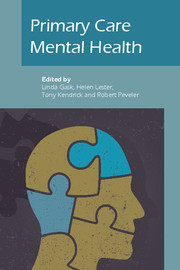Book contents
- Frontmatter
- Contents
- List of figures, tables and boxes
- List of contributors
- Preface
- Part I Conceptual basis and overarching themes
- Part II Clinical issues
- 8 Depression
- 9 Suicide and self-harm
- 10 Anxiety
- 11 Medically unexplained symptoms
- 12 Mental health problems in older people
- 13 Perinatal mental health
- 14 Child and adolescent mental health
- 15 Psychosis
- 16 Emergencies in primary care
- 17 Substance misuse
- 18 Management of alcohol problems
- 19 Eating disorders
- 20 Physical health of people with mental illness
- 21 Ethnic minorities
- 22 Asylum seekers and refugees
- 23 Sexual problems
- Part III Policy and practice
- Part IV Reflective practice
- Epilogue: Racing pigeons and rolling rocks: reflections on complex problems in primary care
- Index
22 - Asylum seekers and refugees
from Part II - Clinical issues
Published online by Cambridge University Press: 02 January 2018
- Frontmatter
- Contents
- List of figures, tables and boxes
- List of contributors
- Preface
- Part I Conceptual basis and overarching themes
- Part II Clinical issues
- 8 Depression
- 9 Suicide and self-harm
- 10 Anxiety
- 11 Medically unexplained symptoms
- 12 Mental health problems in older people
- 13 Perinatal mental health
- 14 Child and adolescent mental health
- 15 Psychosis
- 16 Emergencies in primary care
- 17 Substance misuse
- 18 Management of alcohol problems
- 19 Eating disorders
- 20 Physical health of people with mental illness
- 21 Ethnic minorities
- 22 Asylum seekers and refugees
- 23 Sexual problems
- Part III Policy and practice
- Part IV Reflective practice
- Epilogue: Racing pigeons and rolling rocks: reflections on complex problems in primary care
- Index
Summary
The term ‘asylum seeker’ describes a person who has submitted an application for protection under the 1951 Geneva Convention and is awaiting a decision. Those whose claim is accepted are given ‘refugee’ status. Globally in 2008 an estimated 16 million people sought asylum outside their country of origin, and a further 26 million were internally displaced within their own country (UNHCR, 2008).
Some people may have mental health problems that precede their experiences of conflict and exile. Others develop psychological problems related to violence, detention, torture and bereavement experienced in their home country. Exile itself represents multiple loss – of home, family, friends, familiar places and food, culture and work, as well as support structures – and has been described as a form of ‘cultural bereavement’ (Eisenbruch, 1990).
The stress of the asylum process, with its uncertainties and hostilities, as well as social isolation, racism, poverty and unemployment, can cause mental health problems (Civis Trust, 2004). Silove et al (2000) describe growing evidence that the post-migration stress facing asylum seekers in Australia adds to the effect of previous trauma on their mental health. A study of Iraqi asylum seekers in the UK showed that depression was linked more with poor social support than with a history of torture (Gorst- Unsworth & Goldenberg, 1998).
Some asylum seekers present with psychological problems after having been exiled for some time, after other aspects of life are more settled and secure. Marshall et al (2005) describe Cambodian refugees experiencing mental health problems two decades after resettlement in the USA.
Epidemiology and classification
Studies show a wide range of psychological problems experienced by refugees. Gerritsen et al (2004), in a meta-analysis of population-based studies of refugees living in The Netherlands, found prevalence rates of depression ranging from 3% to 88%, of anxiety ranging from 2% to 80% and of post-traumatic stress disorder (PTSD) ranging from 4% to 70%. The huge range in reported prevalence may be accounted for by variance in the studied populations in their country of origin, length of time in exile and legal status, as well as measurement tools (Mann & Fazil, 2006). However, it also brings into question the universal application of Western psychiatric diagnoses. Ballenger et al (2001) suggested that differences in classification and a lack of culturally appropriate instruments may explain perceived variations in the prevalence of mental illness cross-culturally.
- Type
- Chapter
- Information
- Primary Care Mental Health , pp. 319 - 334Publisher: Royal College of PsychiatristsPrint publication year: 2009

